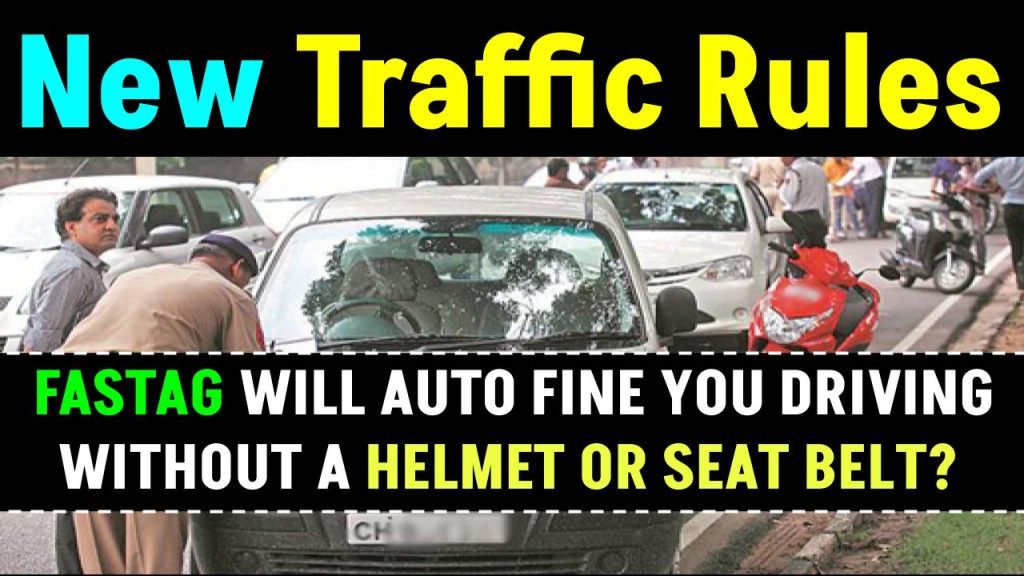
In a significant move to improve road safety and streamline traffic enforcement, the Indian government is considering integrating FASTag technology to automatically fine violators who fail to wear helmets or seat belts.
This proposal comes amid growing concerns about road safety, with statistics showing that non-compliance with basic safety measures like helmets and seat belts is a leading cause of fatalities in road accidents. If implemented, this system could automatically deduct fines from vehicle owners’ FASTag accounts and, in extreme cases, even cancel driving licenses for repeated offenses.
But what does this mean for everyday commuters? Will this system improve road safety, or are there privacy concerns? Let’s explore.
New Traffic Rules
| Topic | Details |
|---|---|
| New Traffic Rules | Authorities considering using FASTag for automatic fine collection for seat belt and helmet violations. |
| Penalty Amount | ₹1,000 for driving without a seat belt; ₹1,000 + license suspension for riding without a helmet. |
| Legal Basis | Motor Vehicles Act, 1988 outlines these penalties. |
| Implementation Concerns | Privacy risks, enforcement accuracy, and financial security. |
| FASTag Role | Already used for toll payments, may now be linked to traffic fines. |
| Official Sources | Ministry of Road Transport & Highways, FASTag NHAI Portal. |
The integration of FASTag for automatic fine collection could be a game-changer for traffic enforcement in India. By automating penalties for seat belt and helmet violations, authorities hope to improve compliance and reduce road accidents. However, privacy, accuracy, and financial security remain key concerns. If implemented, authorities must ensure robust safeguards to prevent misuse.
Until then, the best way to avoid fines and stay safe is simple—follow traffic rules. Buckle up, wear a helmet, and drive responsibly!
Also Check: PM Kisan 19th Installment ALERT! These Farmers Won’t Get Paid—Some May Have to RETURN Money!
New Traffic Rules: Why Is This Change Being Considered?
The Alarming Road Safety Crisis
India has one of the highest road accident rates in the world. According to a Ministry of Road Transport & Highways (MoRTH) report, in 2022:
- Over 1.5 lakh people lost their lives in road accidents.
- 43% of fatalities were due to non-compliance with helmet and seat belt rules.
- Helmet-less two-wheeler riders accounted for 30% of road deaths.
The government sees automation as a way to ensure stricter enforcement and compliance.
The Need for Automated Enforcement
Currently, traffic fines are either manually issued or deducted via digital platforms like e-challans. However, this system has loopholes:
- Many violators ignore e-challans or provide incorrect details.
- Manual policing is limited and inefficient, leading to corruption and missed offenses.
- Traffic congestion makes stopping vehicles difficult, making real-time enforcement a challenge.
By linking FASTag—which is already mandatory for toll payments—to traffic fines, authorities could automatically deduct penalties, ensuring higher compliance.
New Traffic Rules: How Will FASTag Auto-Fining Work?
The proposed system would function as follows:
- AI-Enabled Surveillance Cameras: High-resolution cameras would detect helmet-less riders and seat belt violations at toll plazas and major roads.
- Vehicle Identification: The system would identify the vehicle via its number plate and FASTag account.
- Automatic Fine Deduction: The fine amount would be automatically deducted from the linked FASTag wallet.
- License Penalty for Repeat Offenders: Multiple offenses could lead to license suspension.
This automated system could reduce human intervention, making enforcement more efficient and corruption-free.
New Traffic Rules: Legal Implications: What the Law Says
The Motor Vehicles Act, 1988, and its amendments specify the following penalties:
- Driving without a seat belt: ₹1,000 fine under Section 194(B).
- Riding a two-wheeler without a helmet: ₹1,000 fine + potential license suspension under Section 129 & 194(D).
- Repeat violations: May result in higher penalties or license cancellation.
The proposed FASTag-linked fines would essentially automate these existing laws, rather than introduce new penalties.
New Traffic Rules: Privacy & Security Concerns
While automation sounds promising, many experts are concerned about privacy and security risks:
- Financial Security: Linking FASTag to traffic fines could lead to unauthorized deductions or system errors.
- Data Privacy: Storing and using vehicle data without consent raises concerns over data misuse.
- Enforcement Accuracy: AI-based systems can make errors, leading to wrongful fines.
Experts suggest strong data protection laws and transparent enforcement protocols to prevent abuse of the system.
Also Check: EPS new rules: Now Withdraw Your Pension from ANY Bank – Here’s How
New Traffic Rules: What Drivers & Riders Need to Know
- If this rule is implemented, here’s how you can avoid fines and penalties: Always wear a helmet if you’re riding a two-wheeler.
- Ensure all passengers wear seat belts, even in the back seat.
- Check FASTag account regularly to monitor fines and avoid wrongful deductions.
- Update vehicle details to avoid fines being incorrectly charged.
- Report errors via the official Parivahan e-Challan website.
New Traffic Rules (FAQs)
Is the FASTag fine deduction already in effect?
No, as of February 2025, this is still a proposal under discussion. No official confirmation on nationwide implementation has been made.
Can FASTag be used for automatic fine deduction?
Yes, authorities have previously used FASTag for speeding fines in Bengaluru. If implemented, it could be expanded to seat belt and helmet violations.
How do I dispute a wrongful FASTag fine?
If wrongly fined, you can:
Visit the Parivahan e-Challan portal to check the violation details.
File a dispute online or at your local RTO office.
Contact FASTag customer service for transaction-related issues.
Will this apply to all vehicles?
Yes, it is expected to apply to all vehicles with FASTag. However, enforcement for two-wheelers may require additional infrastructure.
What happens if my FASTag balance is low?
If you have insufficient funds, your FASTag account could be blocked, and you may face additional penalties.









